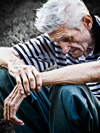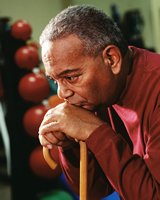Depression After Stroke

After a stroke, your loved one may have many negative feelings. Your loved one may think that things will never get better. This is not true - help is available!
Almost half of all stroke survivors have depression. Depression is a normal response to the losses that occur from a stroke.
What Are the Signs and Symptoms of Depression?
Here is a list of the signs and symptoms of depression. Five or more of these signs or symptoms that last more than two weeks are warning signals for depression.
- Sadness or an “empty” mood
- Feeling guilty, worthless or helpless
- Problems concentrating, remembering or making decisions
- Appetite and/or weight changes
- Feeling hopeless
- Lack of energy or feeling tired and “slowed down”
- Problems with sleep, such as trouble getting to sleep, staying asleep or sleeping too much
- Feeling restless or irritable
- Loss of interest or pleasure in hobbies and activities, including sex, that were once enjoyed
|
Red Flag: Suicidal Thoughts 
|
What Do You Need to Know?
Depression is real − People need help when they have depression.
Physical and emotional changes are common after a stroke − Accept your loved one’s changes.
Expect improvements over time − Things often get better.
Why Is It Important to Get Help?
Treatment of depression will help the stroke survivor recover faster. It will make your job as a caregiver easier. For instance, treating depression helps with:
- Thinking skills and memory
- Physical recovery and rehabilitation
- Language and speech
- Emotions and motivation
What Treatments Should You Discuss with Your Healthcare Team?
Get help from your healthcare team quickly. The stroke survivor and family members may explain away the person’s depression. Make sure that the stroke survivor receives treatment.
- Medicines, such as anti-depressants, improve symptoms.
- Psychotherapy (talk therapy) is used along with medicines. Talk therapy gives your loved one a safe place to talk about feelings.
- Support groups provide help from other stroke survivors and caregivers. They know what you and your loved one are going through. There are support groups for stroke survivors and caregivers like you. Learn more about stroke support groups.
Helpful Tips
- Know the warning signals of depression. Watch for the signs and symptoms of depression. Get help quickly.
- Be patient with your loved one. After a stroke, it will take time for your loved one to understand the changes.
- Help your loved one exercise and take part in fun activities. Learn more about exercising after stroke.
- Encourage friends and your family to visit and talk with your loved one.
- Have a good attitude. Focus on how much your stroke survivor can do. Smile and relax about things you can’t change.
Remember
- Depression is real and should be treated.
- You are the key person to watch for the warning signals of depression.
- Get help quickly if you think your loved one has depression.
Other Resources 
Additional credible resources on this topic can be found here. Website pages may change or update, therefore if a link does not work, you may also try to type the information into your internet search bar. This Resource List will be updated frequently.
References:American Stroke Association. (2008). Depression Trumps Recovery. Retrieved June 16, 2008, from: http://www.strokeassociation.org/presenter.jhtml?identifier=3030377 (This resource is no longer available.); and Robinson, RG, at al. (2008). Escitalopram and problem-solving therapy for prevention of post-stroke depression: a randomized controlled trial. JAMA, 299(20): 2391-400.
These materials were created for the project:
Web-Based Informational Materials for Caregivers of Veterans Post-Stroke
Project Number SDP 06-327 funded by VA HSR&D Quality Enhancement Research Initiative (QUERI);
Supported by the Stroke QUERI



















